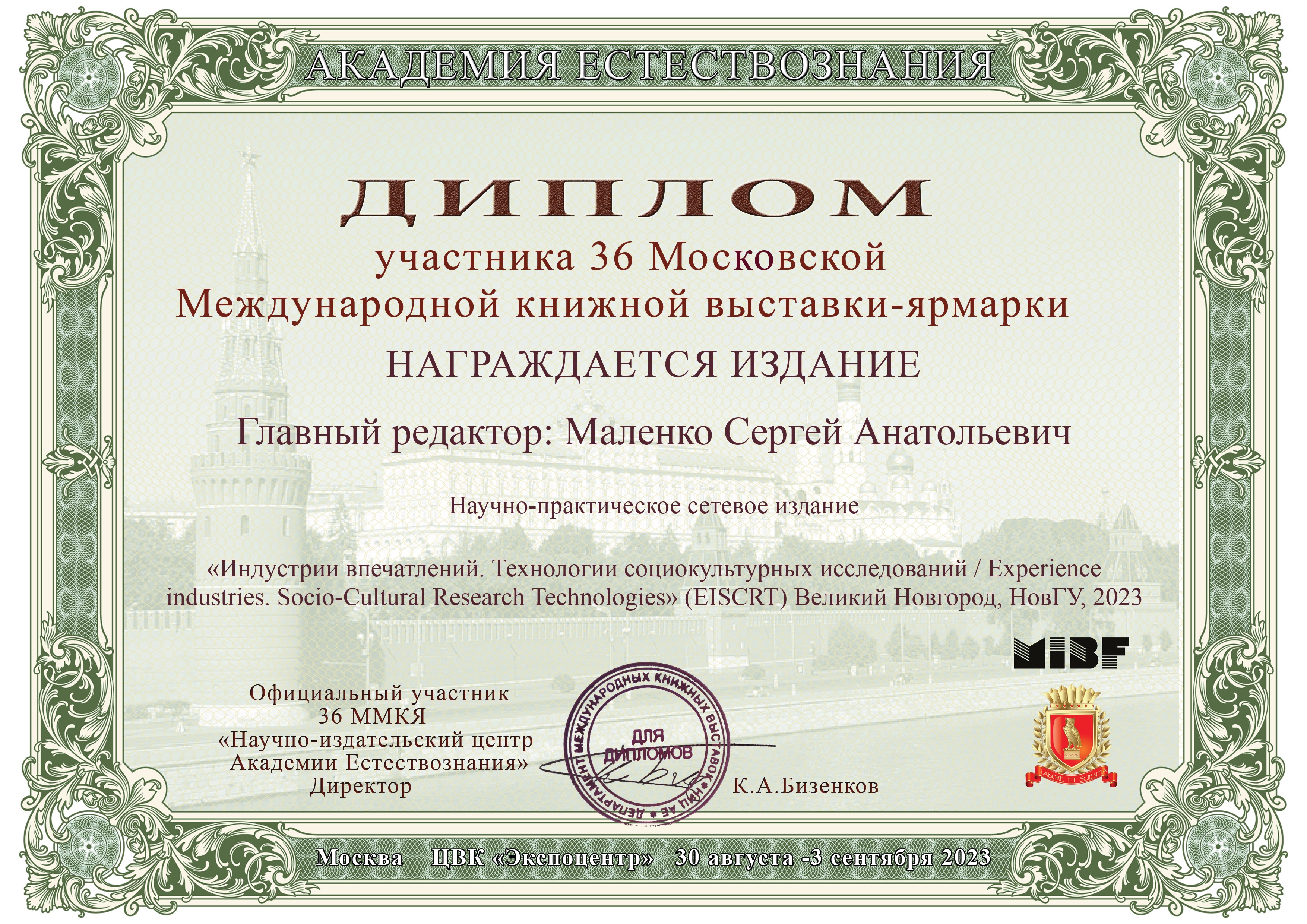POWER ENCHANTING: EXPERIENCE AS A POLITICAL TECHNOLOGY
DOI:
https://doi.org/10.34680/EISCRT-2023-3(4)-09-14Abstract
Dear readers!
The editorial board of the journal “Experience Industries. Sociocultural Research Technologies” (EISCRT) brings to your attention the third issue of our publication in 2023. The current issue is devoted to an interdisciplinary, theoretical, and applied analysis of the methods of forming an emotional attitude to reality that have developed in modern culture and typical scenarios for their imperious interpretation.
This existential practice at some point in time ceased to be the lot of a person’s personal preferences and gradually turned into a subject of political and other institutional speculations, within which constant references to this topic acquire a universally significant and, paradoxically, managerial meaning. Today, politics has ceased to be an activity characteristic of special elite groups. It came out of secret lodges and offices, subjugated, and usurped all available social space. This applies not only to the traditional institutional forms of hierarchical communication. Politics has successfully “sprouted” into the sphere of everyday life of the inhabitants and began to claim control over the existential, intimate aspects of the life of every person.Moreover, politics got used to new spaces rather quickly and successfully channeled emotional flows, turning their almost inexhaustible energy in its favor. Thus, a whole technology of turning emotions into a strategic and tactical resource of power began to take shape. As a result, today, at the beginning of the 21st century, no matter what we talk about: either about the topology of the city, or about outstanding historical events and persons, or about everyday life or about world-famous works of art, etc., we always and in everything find a more or less noticeable presence of the discourse of power with its characteristic visual signs and symbolic practices.
The first text that opens this issue of the journal is presented by our Moscow colleagues Lidia Sonina and Vladimir Churin. They analyze the phenomenon of high-rise buildings in modern megacities and its impact on society and people. Based on a sociological approach, the authors come to a reasonable conclusion that a “high-rise” is a status symbol that securely fixes civilizational and cultural practices of housing consumption, and also represents a technology for fixing social status, undoubtedly reflected in the number of stories of such structures. The authors warn society and the government against widespread high-rise buildings, since it is precisely this that becomes an important scenario for the consolidation and aggravation of social inequality.
Our Crimean author Oleg Shevchenko, continuing his multyyear research, talks about the difference in the aesthetic experience of perceiving the “Yalta World” in the Soviet-Russian and Anglo-Saxon historical, cultural, and political discourses. The author argues that the West, as a rule, “demonizes” the famous Yalta events of 1945 and analyzes them through the concepts of “Hades”, “Chronos” and “Death”. While Soviet-Russian political practices “angelize” this part of Soviet and world history and promote this tradition in a whole series of feature films and novels.
The analysis of the Soviet ideological experience is continued by the article by Ivan Suslov, who seeks to define the body of V. I. Lenin as a unique biopolitical phenomenon of our time. In this context, Lenin turns out to be a cultural simulacrum aimed at the large-scale socialization of both the adult and child populations in the Soviet Union and post-Soviet Russia. Technologies of translation of Lenin’s corporality become ways of forming the “correct” socializing biopolitical techniques for children and adults.
The section “Traditions” presents intermediate results of studies of domestic and foreign artistic practices that translate leading social and existential meanings. Saratov scientists Denis Artamonov and Sofya Tikhonova analyze the phenomenon of nostalgia for the era of the USSR, expressed in a few macro-narratives and images that are present in the space of modern mass culture. The image of a vampire is a symbolic trend that connects the past, present, and future and organically visualizes the ideas of contemporaries about the alternative Soviet past.
Professor Elena Kornilova reflects on the place of Gothic values in the American television series “Wednesday”. On the example of this series, it is established that the Gothic myth and its meanings are extremely relevant for the modern youth environment of different countries and cultures. The central character of this film story is a toxic feminist heroine who lives only for her own interests, and all her actions are antisocial. Thus, through such glorification, the mass audience is imperceptibly drawn into the atmosphere of universal madness.
The last article of this issue is also devoted to the continuation of scientific reasoning about the dialectic of norm and pathology. Sergey Malenko and Andrey Nekita point out that, unlike gothic personal myths, this dichotomy can also be productively viewed in the context of a militarized artistic experience that has been developed over decades within the tradition of American horror films. “Hot” wars, very characteristic of this genre, reveal the essence of the insurmountable conflict between the elites and the masses, which turns into “cosmic” suffering and the final collapse of the entire “familiar” social world.
It is noteworthy that heading “Reviews” appears on the pages of our publication starting from this issue. When necessary, we will offer our readers and future authors reviews of certain scientific, scientific journalism or other publications that, for one reason or another, seemed to us particularly interesting, relevant, and topical. In the first issue of the column, we present a review entitled “Times are not chosen. They live and die in them” to a stunning collection of philosophical prose and poetry called “Russian Thought Lives...”, which has no analogues in Russian scientific, educational, and cultural space.
It is dedicated to the memory of Daria Dugina, a Russian philosopher, talented journalist, public and political figure, daughter of Alexander Dugin, who tragically and untimely departed for a better world. The collection was created on the initiative and with the direct participation of our longtime friends, colleagues, partners and associates from Crimea Oleg Shevchenko and Oleg Gabrielyan. In all the interviews, articles, essays, original literary and poetic forms included in the publication, there is a clear idea that the protection and reverent creation of the Russian world is today the true vocation of a true patriot, regardless of the place and date of birth, national and religious affiliation, professional vocation, the presence or absence of any hobbies and interests.
The editorial board hopes that the materials of the issue will be an excellent occasion for continuing an unbiased and professional conversation about the fate of modern man and society, drawn into an endless series of institutional manipulations.
For article citations:
Malenko, S. A. (2023). Power Enchanting: Experience as a Political Technology. Experience industries. Socio-Cultural Research Technologies (EISCRT), 3 (4), 9–19. https://doi.org/10.34680/EISCRT-2023-3(4)-9-19








